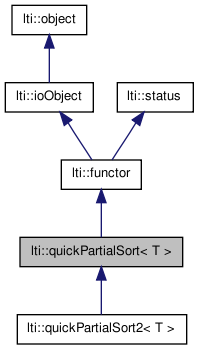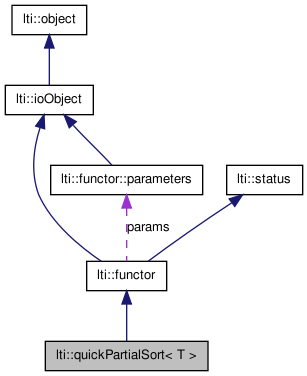

|
latest version v1.9 - last update 10 Apr 2010 |
|
#include <ltiQuickPartialSort.h>


Classes | |
| class | parameters |
| The parameters for the class quickPartialSort. More... | |
Public Member Functions | |
| quickPartialSort () | |
| quickPartialSort (const quickPartialSort< T > &other) | |
| virtual | ~quickPartialSort () |
| virtual const char * | getTypeName () const |
| bool | apply (matrix< T > &srcdest) const |
| bool | apply (const matrix< T > &src, matrix< T > &dest) const |
| bool | apply (vector< T > &srcdest) const |
| bool | apply (const vector< T > &src, vector< T > &dest) const |
| bool | apply (std::vector< T > &srcdest) const |
| bool | apply (const std::vector< T > &src, std::vector< T > &dest) const |
| bool | apply (const int pivotIndex, matrix< T > &srcdest) const |
| bool | apply (const int pivotIndex, const matrix< T > &src, matrix< T > &dest) const |
| bool | apply (const int pivotIndex, vector< T > &srcdest) const |
| bool | apply (const int pivotIndex, const vector< T > &src, vector< T > &dest) const |
| bool | apply (const int pivotIndex, std::vector< T > &srcdest) const |
| bool | apply (const int pivotIndex, const std::vector< T > &src, std::vector< T > &dest) const |
| quickPartialSort & | copy (const quickPartialSort &other) |
| virtual functor * | clone () const |
| const parameters & | getParameters () const |
Protected Member Functions | |
| T | findMedian (vector< T > &vct, const int &begin, const int &end, const int &medianPos) const |
| int | partition (vector< T > &vct, const int &begin, const int &end) const |
| T | findMedian (std::vector< T > &vct, const int &begin, const int &end, const int &medianPos) const |
| int | partition (std::vector< T > &vct, const int &begin, const int &end) const |
Quick partial sort.
This class is used to extract the n smallest elements of a vector, without requiring to complete the sort. Since the apply method expects the index of the element you want for sure at its destination if the vector were completelly sorted, to get the first n elements you need to give the apply method "n-1".
It is usually employed when you just required, for example, the three smallest elements of a vector. In this case you would apply(2,vct), since "2" is the index of the third element of the vector.
A major difference to the STL method std::partial_sort is that this functor don't even sorts the elements at the begining, it just ensures that they are smaller or equal the element at the given position, and that the elements after the final one at the pivot position are greater or equal the pivot element. In this sense, this corresponds to the std::partition algorithm, but here we use the LTI-Lib functor-based interface.
The type of the vector elements T must accept the operator< and operator=.
Note that this functor always sorts in increasing order. If you need the n greatest elements, then just give as pivot-index vct.size()-n, and the last elements are the ones you are looking for.
You may also be interested in the std::nth_element and std::partial_sort functions of the <algorithms> file, which can be better if you are dealing with STL structures or if you really want to sort the beginning of your vector. Since these standard functions are templates, you can also use them with lti::vectors.
| lti::quickPartialSort< T >::quickPartialSort | ( | ) |
default constructor
| lti::quickPartialSort< T >::quickPartialSort | ( | const quickPartialSort< T > & | other | ) |
copy constructor
| other | the object to be copied |
| virtual lti::quickPartialSort< T >::~quickPartialSort | ( | ) | [virtual] |
destructor
| bool lti::quickPartialSort< T >::apply | ( | const int | pivotIndex, | |
| const std::vector< T > & | src, | |||
| std::vector< T > & | dest | |||
| ) | const |
Partially sorts the vector on-copy.
| pivotIndex | pivot position on the given vector. The result has the first "pivotIndex" elements smaller or equal the rest of the vector elements. | |
| src | vector<T> with the source data. | |
| dest | the partially sorted vector. |
| bool lti::quickPartialSort< T >::apply | ( | const int | pivotIndex, | |
| std::vector< T > & | srcdest | |||
| ) | const |
Partially sorts the vector on-place.
| pivotIndex | pivot position on the given vector. The result has the first "pivotIndex" elements smaller or equal the rest of the vector elements. | |
| srcdest | vector<T> with the source data. The result will be left here too. |
| bool lti::quickPartialSort< T >::apply | ( | const int | pivotIndex, | |
| const vector< T > & | src, | |||
| vector< T > & | dest | |||
| ) | const |
Partially sorts the input vector and leaves the result in the destination vector.
| pivotIndex | pivot position on the given vector. The result has the first "pivotIndex" elements smaller or equal the rest of the vector elements. | |
| src | vector<T> with the source data. | |
| dest | the partially sorted vector. The first pivotIndex elements are less or equal than the rest of the elements of the vector. |
| bool lti::quickPartialSort< T >::apply | ( | const int | pivotIndex, | |
| vector< T > & | srcdest | |||
| ) | const |
Operates on the given parameter.
The resulting vector has its first pivotIndex elements of smaller or equall than the rest of the elements.
| pivotIndex | pivot position on the given vector. The result has the first "pivotIndex" elements smaller or equal the rest of the vector elements. | |
| srcdest | vector<T> with the source data. The result will be left here too. |
| bool lti::quickPartialSort< T >::apply | ( | const int | pivotIndex, | |
| const matrix< T > & | src, | |||
| matrix< T > & | dest | |||
| ) | const |
Partially sorts given matrix, which is NOT modified.
The elements of the matrix will be considered as part of a vector with "columns()" times "rows()" elements.
| pivotIndex | pivot position on the given vector. The result has the first "pivotIndex" elements smaller or equal the rest of the vector elements. | |
| src | matrix<T> with the source data. | |
| dest | the median value of the given matrix. |
| bool lti::quickPartialSort< T >::apply | ( | const int | pivotIndex, | |
| matrix< T > & | srcdest | |||
| ) | const |
The given matrix is used as source and destination.
The matrix will be considered as a vector, where the rows of the matrix are simply concatenated. The first parameters::pivotIndex elements of the resulting matrix will be smaller or equall than the rest of the elements.
| pivotIndex | pivot position on the given vector. The result has the first "pivotIndex" elements smaller or equal the rest of the vector elements. | |
| srcdest | matrix<T> with the source data. The result will be left here too. |
| bool lti::quickPartialSort< T >::apply | ( | const std::vector< T > & | src, | |
| std::vector< T > & | dest | |||
| ) | const |
operates on the given parameter.
| src | vector<T> with the source data. | |
| dest | the partially sorted vector. |
| bool lti::quickPartialSort< T >::apply | ( | std::vector< T > & | srcdest | ) | const |
Partially sorts the vector on-place.
| srcdest | vector<T> with the source data. The result will be left here too. |
| bool lti::quickPartialSort< T >::apply | ( | const vector< T > & | src, | |
| vector< T > & | dest | |||
| ) | const |
Partially sorts the input vector and leaves the result in the destination vector.
| src | vector<T> with the source data. | |
| dest | the partially sorted vector. The first pivotIndex elements are less or equal than the rest of the elements of the vector. |
| bool lti::quickPartialSort< T >::apply | ( | vector< T > & | srcdest | ) | const |
Operates on the given parameter.
The resulting vector has its first parameters::pivotIndex elements of smaller or equall than the rest of the elements.
| srcdest | vector<T> with the source data. The result will be left here too. |
| bool lti::quickPartialSort< T >::apply | ( | const matrix< T > & | src, | |
| matrix< T > & | dest | |||
| ) | const |
| bool lti::quickPartialSort< T >::apply | ( | matrix< T > & | srcdest | ) | const |
The given matrix is used as source and destination.
The matrix will be considered as a vector, where the rows of the matrix are simply concatenated. The first parameters::pivotIndex elements of the resulting matrix will be smaller or equall than the rest of the elements.
| srcdest | matrix<T> with the source data. The result will be left here too. |
| virtual functor* lti::quickPartialSort< T >::clone | ( | ) | const [virtual] |
returns a pointer to a clone of this functor.
Implements lti::functor.
Reimplemented in lti::quickPartialSort2< T, U >.
| quickPartialSort& lti::quickPartialSort< T >::copy | ( | const quickPartialSort< T > & | other | ) |
copy data of "other" functor.
| other | the functor to be copied |
Reimplemented from lti::functor.
| T lti::quickPartialSort< T >::findMedian | ( | std::vector< T > & | vct, | |
| const int & | begin, | |||
| const int & | end, | |||
| const int & | medianPos | |||
| ) | const [protected] |
this method calculates the median in a recursively form
| T lti::quickPartialSort< T >::findMedian | ( | vector< T > & | vct, | |
| const int & | begin, | |||
| const int & | end, | |||
| const int & | medianPos | |||
| ) | const [protected] |
this method calculates the median in a recursively form
| const parameters& lti::quickPartialSort< T >::getParameters | ( | ) | const |
returns used parameters
Reimplemented from lti::functor.
| virtual const char* lti::quickPartialSort< T >::getTypeName | ( | ) | const [virtual] |
returns the name of this type ("quickPartialSort")
Reimplemented from lti::functor.
Reimplemented in lti::quickPartialSort2< T, U >.
| int lti::quickPartialSort< T >::partition | ( | std::vector< T > & | vct, | |
| const int & | begin, | |||
| const int & | end | |||
| ) | const [protected] |
this method chooses a pivot-value and ensures that lower values lie at the left and higher values at the right of its final position, which will be returned.
| int lti::quickPartialSort< T >::partition | ( | vector< T > & | vct, | |
| const int & | begin, | |||
| const int & | end | |||
| ) | const [protected] |
this method chooses a pivot-value and ensures that lower values lie at the left and higher values at the right of its final position, which will be returned.